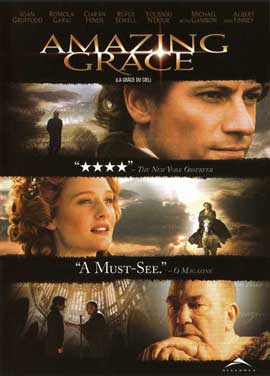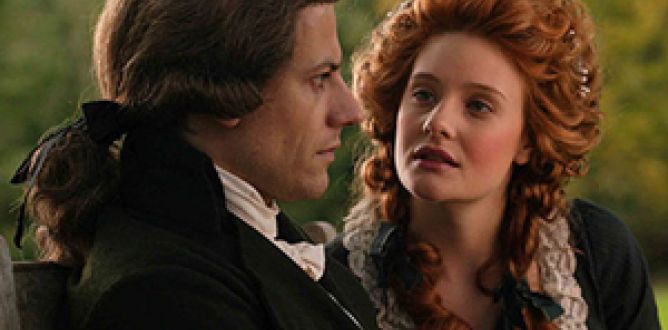 For the last month, I’ve been busy with the blog tour launching my latest novel: Murder at Northanger Abbey. Next up? I have just a few chapters written so far of another P&P book, this one from Mr. Darcy’s point of view. Also, I have not one but two audio books in production! Leap of Hope is already recorded and just needs to go through the final editing process. And Murder at Northanger Abbey will hopefully follow close behind!
For the last month, I’ve been busy with the blog tour launching my latest novel: Murder at Northanger Abbey. Next up? I have just a few chapters written so far of another P&P book, this one from Mr. Darcy’s point of view. Also, I have not one but two audio books in production! Leap of Hope is already recorded and just needs to go through the final editing process. And Murder at Northanger Abbey will hopefully follow close behind!
Now, on to the main topic of this post: the movie Amazing Grace. I first saw this excellent movie several years ago, but current events got me thinking about (and watching) it again.
As you probably know, there has recently been some thought-provoking discussion within Jane Austen circles about the presence and the role of non-whites in Regency England. And some very informative articles on the subject have been posted here at Jane Austen Variations by others over the last few weeks. I will not attempt to duplicate their fine work, only invite you to scroll back through if you missed them.
For today, I’ll just reiterate that Regency England was not as homogeneously Caucasian as people often suppose. There were small yet significant numbers of people of color living in England at the time, even some in high position. Jane Austen herself included a mixed race heiress in her unfinished novel Sanditon (expanded into a recently-aired mini-series):
Of these three, and indeed of all, Miss Lambe was beyond comparison the most important and precious, as she paid in proportion to her fortune. She was about seventeen, half mulatto, chilly and tender, had a maid of her own, was to have the best room in the lodgings, and was always of the first consequence in every plan … (Sanditon)
 My point is that Jane Austen must have had at least some exposure to people of other races. And although she never addressed wars and political movements head on in her novels, she, and her characters likewise, were not unaware of the major issues of the day, one of those (arguably the most significant) being the debate over abolishing the slave trade that generated so much wealth for the British empire and many of its upper class families, and which is also the subject of Amazing Grace.
My point is that Jane Austen must have had at least some exposure to people of other races. And although she never addressed wars and political movements head on in her novels, she, and her characters likewise, were not unaware of the major issues of the day, one of those (arguably the most significant) being the debate over abolishing the slave trade that generated so much wealth for the British empire and many of its upper class families, and which is also the subject of Amazing Grace.
The topic is mentioned in passing at least twice in Austen’s novels. In Mansfield Park, Fanny tells Edmund, “But I talk to [my uncle] more than I used. I am sure I do. Did not you hear me ask him about the slave-trade last night?” In Emma, Mrs. Elton exclaims to Jane Fairfax, “Oh! my dear, human flesh! You quite shock me; if you mean a fling at the slave-trade, I assure you Mr. Suckling was always rather a friend to the abolition.”
 Amazing Grace (2006) is based on the true story of William Wilberforce (Ioan Gruffudd) and his passionate, courageous, decades-long quest to end British sanction of and participation in the slave trade, a quest that is ultimately successful. Along the way, he faces intense opposition, but he also finds formidable allies in the fight:
Amazing Grace (2006) is based on the true story of William Wilberforce (Ioan Gruffudd) and his passionate, courageous, decades-long quest to end British sanction of and participation in the slave trade, a quest that is ultimately successful. Along the way, he faces intense opposition, but he also finds formidable allies in the fight:
 John Newton (Albert Finney), a reformed slave ship captain turned Christian minister, who penned the beloved hymn that gives the movie its title.
John Newton (Albert Finney), a reformed slave ship captain turned Christian minister, who penned the beloved hymn that gives the movie its title.
William Pitt (Benedict Cumberbatch) Wilberforce’s college friend and the youngest prime minister ever.
Barbara Spooner (Ramola Garai) a staunch abolitionist who becomes Willberforce’s wife.
Lord Charles Fox (Michael Gambon) a powerful and unlikely parliamentary ally.
Thomas Clarkson (Rufus Sewell) a radical abolitionist ready for revolution, if necessary.
 Olaudah Equiano (Youssou N’Dour) a former slave who purchased his own freedom and went on to publish his compelling and hugely successful autobiography depicting the horrors of slavery.
Olaudah Equiano (Youssou N’Dour) a former slave who purchased his own freedom and went on to publish his compelling and hugely successful autobiography depicting the horrors of slavery.
And others, many of the Quaker faith. So while William Wilberforce took the fight to parliament, people from various backgrounds and walks of life worked tirelessly with him, together changing the tide of public opinion and the course of history.
Ioan Gruffud delivers a brilliant performance as Wilberforce. And as you can see, the rest of the cast is stacked from top to bottom with nothing but the best dramatic talent. You can add to this list another old friend from Persuasion ’95: Ciaran Hinds in a less-sympathetic, less-heroic role this time, as Lord Tarleton, an outspokenly pro-slave-trade MP.
As with any dramatization, significant creative license has no doubt been taken, but my understanding is that the story line follows historical facts pretty closely. And some parts – portions of Wilberforce’s speeches, for example – are taken directly from existing parliamentary records, etc. That’s the case with the caption in the picture below – what Lord Charles Fox said of Wilberforce when the battle in parliament was finally won.
 All this took place during Jane Austen’s lifetime.
All this took place during Jane Austen’s lifetime.
No movie can be all things to all people. Obviously, no movie can tell every aspect of such a complex, far-reaching, generations-long, globe-spanning issue as slavery. But Amazing Grace does an amazingly good job of illuminating the particular aspect of the story that is its focus: the atrocity of the slave trade and the political fight to end British involvement in it. That is an important story that deserves to be told, heard, and remembered. Amazing Grace is a must-see movie on those grounds alone, even aside from the fact that it is a tremendously well-made film.

10 comments
Skip to comment form
I saw this movie when it was first released. It is a powerful movie, worth another viewing.
Author
Yes, absolutely worth another look, Karen! I was so glad I did.
Where is this playing? Netflix? Is it being rereleased? Or do you have to buy the DVD? I have been aware of this story but have not seen the film. The song is one which evokes strong feelings for me…not just in its connection to this issue but as a Christian. Thanks for sharing.
Author
No re-release that I know of, Sheila. Look for it wherever you get movies, these days. I happen to own the DVD, so I didn’t have to go far.
Yes, the song is very evocative for so many, although in some ways I’m surprised that it ended up as the title, since it doesn’t play that large a role in the story.
I haven’t seen the movie yet, though I’ve done a lot of reading about Wilberforce for my new book, where a main character spends several years as one of his assistants. It’s given me a new understanding of the issues Jane Austen must have heard about frequently during her life. The questions of abolition and slavery must have been vital and present for her. No surprise they appeared in her books and letters! Now I’m really looking forward to finding the movie. Thanks for this description of it!
Author
I hope you enjoy it, Abigail! With your recent research, you will be a better judge than I am as to its accuracy. I trust that they got the spirit of those pivotal events correct in the movie, if not each and every detail.
Thank you for this recommendation, I will look it up on Google play. The cast role call is rich with talent.
Author
Yes, the cast is awesome, and I hope you agree with me afterward that it is a must-see movie!
Our Anglican Church took a field trip together to the nearest movie theater and watched this film when it was first released; I took our older kids along as part of their homeschooling history lesson as we were studying British history at the time. Our priest has studied Wilberforce for years, writing several essays on him in seminary, and he thought that this film was very close to what he knows of Wilberforce’s life and writings with just a few minor dramatic changes.
I’ve been thinking that Amazing Grace deserves a re-watch, so I may have to do that soon. The Dean of Canterbury Cathedral mentioned Wilberforce in one of his ruminations during Morning Prayer last week which reminded me of the film. 🙂
It’s slightly off-topic but I wanted to share that I am sooooo enjoying the Canterbury Cathedral YouTube channel at https://www.youtube.com/channel/UCL4_2pO–uILxV6LSRfjOpw
If anyone would like a taste of Church of England worship which has not changed much since Austen’s time (with the exception of female priests, bishops, and canons), check out the Morning Prayer or Evening Prayer services daily (20-25 minutes each), with additional services on Sundays.
Warmly,
Susanne 🙂
Author
Thanks so much for your remarks, Susanne! I’m glad to hear that someone who knows much more about it than I do (your priest), can confirm that the movie is quite faithful to the historical facts. Yes, do watch it again!